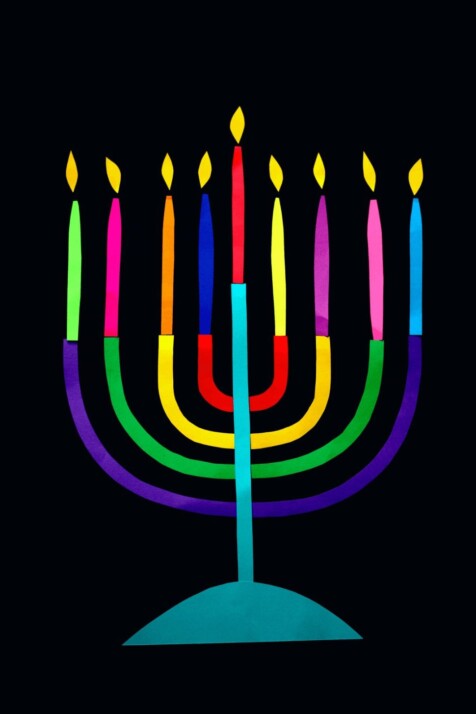There are more than 18 possible ways to spell Hanukkah. Because Hanukkah is transliterated from Hebrew letters, there are numerous ways to spell the holiday’s name.
Most frequently used in English are “Hanukkah” and “Chanukah.” Before we delve into its spellings, let’s crack its meaning!
What is Hanukkah? The meaning of Hanukkah is “dedication.” The event commemorates the victory of the Maccabees, a group of Jewish rebels, over the Greco-Syrians in recovering their temple.
Hanukkah, or the Festival of Lights, is an eight-day Jewish holiday that commemorates the re-dedication of the Holy Temple (the Second Temple) in Jerusalem.
On 25 Kislev, according to the Hebrew calendar, Hanukkah is commemorated for eight nights and days. The celebration occurs at any time between late November and December in Gregorian calendars.
Now that we know the genesis of Hanukkah, let’s delve into significant facts of the tradition and explore ways to spell Hanukkah.

Ways to Spell Hanukkah (or is it Chanukah?)
Hanukkah has a whopping 24 distinct spellings in the Oxford English Dictionary. With a few exceptions, there are 18 different spellings based on four different ways words sound:
- “H” or “Ch” is the first letter.
- “nn” or “n” is the second consonant.
- “kk” or “k” is the third consonant.
- “ah” or “a” comes at the end of the word.
The 18 different spellings are:
- Hanukkah, Chanukah, Hanukah, Hannukah, Chanuka
- Chanukkah, Hanuka, Channukah, Chanukka, Hanukka
- Hannuka, Hannukkah, Channuka, Xanuka, Hannukka,
- Channukkah, Channukka, Chanuqa
As long as you understand what the holiday is all about, it doesn’t matter how you spell it.
Hanukkah and Chanukah are the most prevalent spellings, yet as a society, we haven’t been able to settle on a single correct spelling. (Is there anything more Judaic than this?)
Why is there such a fuss spelling ‘Hanukkah’? In a nutshell, it boils down to transliteration difficulties. There is no established system for transliterating Hebrew to English; thus, it’s a case-by-case scenario.
Many Hebrew and Yiddish nouns (such as Matza/Matzo) have numerous spellings. The word “Hanukkah” begins with the letter “Chet” in Hebrew. Chet has been a particularly contentious letter to transliterate due to the lack of an English “Ch” sound (similar to a Spanish “j” sound).
“H” and “Ch.” are acceptable terms of endearment. We spell ‘Hanukkah’ with a double “k,” whereas ‘Chanukah’ is just one.
A common argument for this is: “why double the k?” This question is impossible because, in current Hebrew, the sound is identical to that of a single English k.
The dagesh indicates a consonant’s intensification (or doubling) in Classical Hebrew. The diacritic mark is a dagesh: a little dot inside the Hebrew letter kaf () modifies how we pronounce the letter.”
Significant Facts to Know about Hanukkah
Compared to other Jewish holidays, Hanukkah is not a significant religious celebration.
During the Hanukkah holiday, around 17.5 million donuts are consumed in Israel. Sufganiyot—oily jelly donuts—are a traditional Hanukkah dish in Israel.
Dreidel is a popular gambling game during the Hanukkah festival. The Dreidel Was Used To Disguise Oneself While Engaging in Torah Study.
Because it was illegal for Jews to study the Torah in Ancient Greece, they used the dreidel to deceive the Greeks if caught.
There is no religious significance to the Hanukkah candles. They are not to be used for anything productive or of any use to anyone. The shamus is readily available, ensuring that the Hanukkah candles aren’t unintentionally used to light the fireplace or serve other functions.
The White House Participates In Hanukkah Festivities. Hanukkah was officially recognized as a federal holiday by Jimmy Carter in 1979, and every president has held a menorah lighting ceremony.
To Wrap Up
Hanukkah is spelled differently depending on the country or language it is written in. However, it doesn’t matter which one you choose. You have nothing to fear from insulting anyone — not even Jews.
Explore All Spell Check Articles
How to Improve Your Spelling As an Adult
Both native speakers and language learners find English spelling tough to master. Because English is a language that absorbs new…
How to Spell Yesterday — a Quick Spelling Guide
There are times when English can seem confusing. Many of the words in English are freely borrowed from other languages.…
Can’t Spell Review? Read This Right Away!
There are times when English spelling can appear confusing. English borrows many of its words from other languages. This Germanic…
How to Spell None — a Quick Spelling Guide
Sometimes, English spelling can seem perplexing. Many of the words in English originated in other languages. Germanic language English consists…
Having Some Issues? Correct Spelling of Issue!
English may seem confusing at times. Many of the words in English were freely borrowed from other languages. Languages such…
The Correct Way of Spelling Decide!
English spelling can sometimes seem confusing. English borrows many of its words from other languages. English, a Germanic language, consists…
